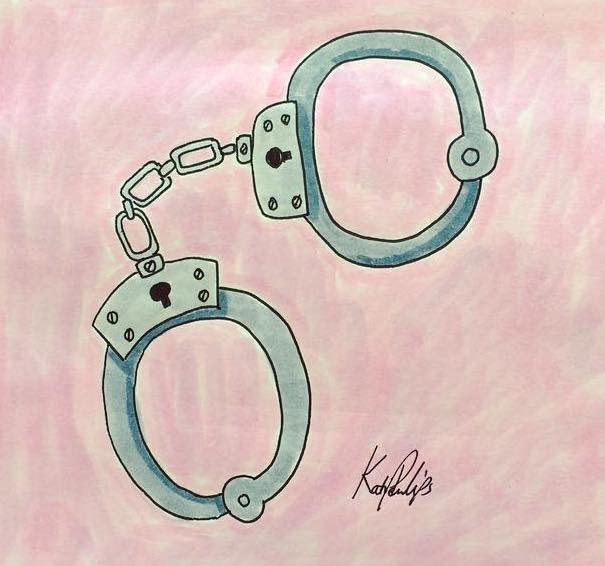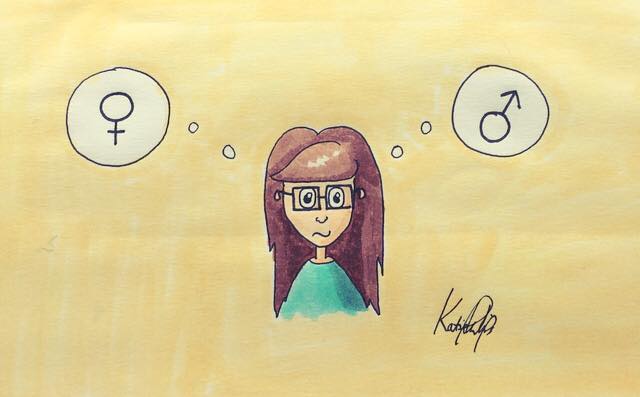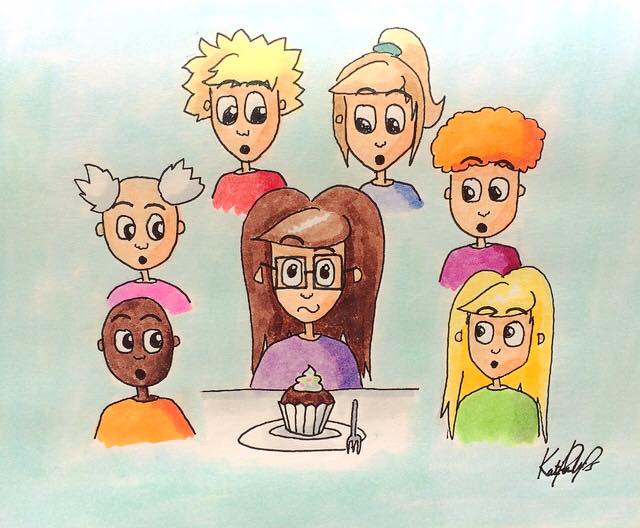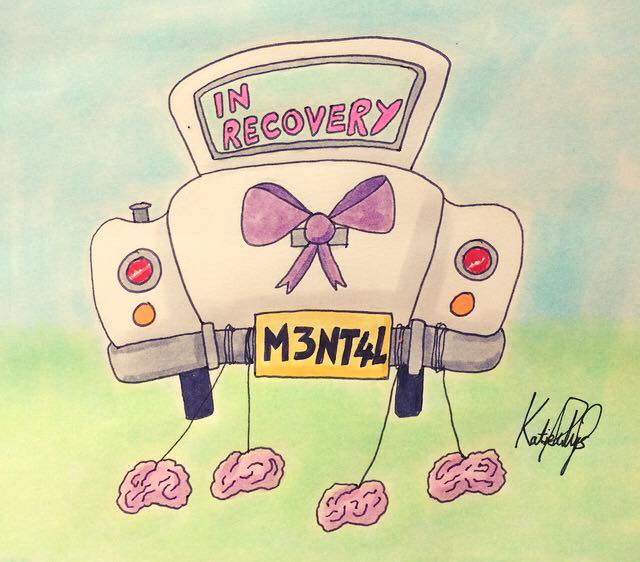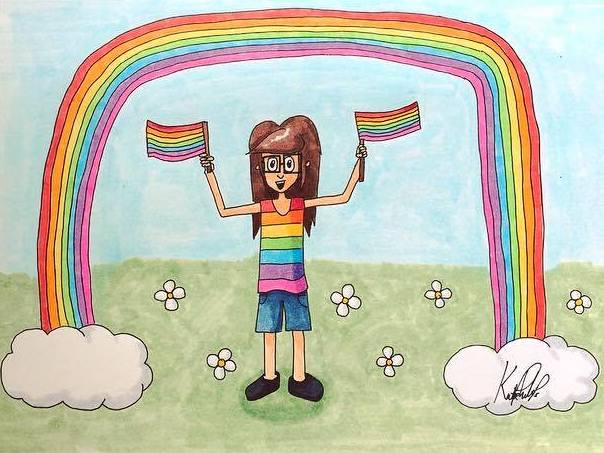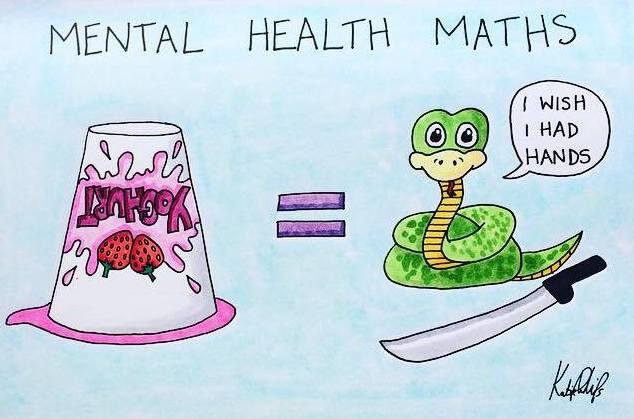I honestly don’t know where to begin with this week’s blog, as lord knows it has been a fairly traumatic seven days.
I guess I will just have to start at the very beginning (a very good place to start according to a certain Maria Von Trapp), the beginning being Saturday afternoon when things with my mental health blew up like some atomic bomb (and by atomic bomb I mean a really massive nuclear weapon of mass destruction and total insanity. There was even a mushroom cloud).
So, picture the scene, it is Saturday afternoon and I am with my mum in the car outside my house (as in the family home where I grew up, not the flat) and we were talking about the fact that from today, my parents are going on holiday for two and a half weeks. Now, I realise that I am 26 years old and should therefore feel fine about being left alone for two and a half weeks, but due to my issues I am incredibly reliant on my parents and in reality they are more like a pair of carers as opposed to members of my family. Indeed, as I may have mentioned before, my mum gave up work to look after me full time as my level of independence is quite low, especially when I am struggling as much as I am now, and in fact my level of independence has been rapidly falling in recent weeks because the noise in my head is so loud that I have been finding it hard to take care of myself properly. I also fear this holiday because due to my diagnosis of Borderline Personality disorder (or Emotionally unstable personality disorder as the kids are calling it these days), I have an extreme fear of abandonment, which manifests itself in me doing anything I can to keep people from leaving me alone. I want to write a full blog about this fear of abandonment thing one day but for now just know that the idea of being left by my parents strikes absolute terror into my very core.
When mum and I were talking about the holiday then, I became extremely anxious and things only got worse and worse as time went on. It was then after about ten minutes of conversation that it happened. I snapped.
It is extremely difficult to explain what I mean by that but basically it was like a switch went off in my brain and I became so terrified of being left alone that I completely lost control, so the rest of the scene happened in a total blur with me sort of watching the action and what I was doing rather than taking part in it. As soon as the thing in my brain snapped I just started hysterically screaming and crying and then for some reason I started to lash out. Like I said, all that happened was a total blur but from what I have been told afterwards in this lashing out I ended up hurting my mum and then in an act of total wildness I grabbed her phone and smashed it in the road. Naturally, my mum was terrified so she ran into the house without me, at which point I was left alone in the garden and the screaming in my head got worse. As you know, I have OCD with an extreme fear of contamination and in my daily life I barely touch anything unless it has been antibacterialised before hand, yet at this point I was so out of control that I started actively tearing up plants from the garden, running my oh so perfectly washed hands through the filth and soil, ripping roots and flowers like a maniac. I could feel the dirt wedging itself in my fingernails as I grabbed at the earth but still I couldn’t stop until the point where the anxiety in my mind reached such a point that I realised I need to stop the noise and the only way I could see to do this was to end my life. At this realisation I ran from the house, sprinting faster than Usain Bolt on steroids, the only thought in my head being that I needed to end my life. I won’t tell you exactly how I planned to do this as I don’t think that is helpful for anyone, but just know that I ran and I ran, desperate to reach the moment where I could end it all and in turn end the terrible thoughts.
For about half an hour I was running alongside a river, looking around in fear that someone was going to save me and it was at about this point that I saw the first policewoman. As I saw her I started to panic but she let me pass without a word so I thought I was “safe” and continued on. Soon however I reached a pub, and it was here that I spotted two police cars in the distance as well as two police officers coming towards me. It was then that I realised that they were here for me and I froze like a deer in the headlights. I wanted to run but as I turned I saw the other policewoman coming from the other way and I found that I was completely ambushed. Still I tried to escape, but the three of them managed to trap me in a corner where I stood crying and shaking uncontrollably. As we stood there they asked me a few questions and then told me that I had to go with them. Naturally, this was not what I wanted at all, I wanted to be left alone to die but I had no choice in the matter and after a few more words I was escorted by the police through a giant crowd of people in a beer garden, enjoying their drinks in the summer sun, and into a police car. It was quite possibly the most humiliating experience of my life. Once in the car I was then driven home, but as two police officers went into the house I was left locked in the vehicle with the third police woman who was trying to calm me down. I however could not calm down and this fact was only made worse when the other two police officers came back to the car and told me that I was being arrested for assault, and criminal damage against my mum’s phone and the garden. It was honestly like something out of a movie with the police officer saying that whole speech about how I didn’t have to say anything but anything I did say could be given in evidence etc etc. Desperately, I pleaded to be allowed to speak to my mum or at least give her a hug as I was so afraid, but the police officers refused and with that I was driven to a police station where I was supposed to be interviewed by a sergeant. I however, was far too distressed to talk, so I was taken into a police cell with a new policewoman, an extremely empty, cold and uncomfortable room with nothing in it other than a bench. Together we sat on the bench, me frantically asking questions and begging to go home but the woman would not talk to me. I don’t know how long we stayed in the police cell (it felt like forever) but eventually one of the previous police officers appeared to tell me that because all of my actions were due to mental health problems I was being “de-arrested” and instead sectioned under Section 136 of the Mental Health Act. It is likely that if you have any mental health problems yourself you will know what a 136 is, but if you don’t it is basically a Section of the Mental Health Act under which police can detain you if they deem you to be at extreme risk of hurting yourself or other people. This then meant that I had to go to a hospital, so without further ado I was placed into an ambulance, driven to a 136 hospital and then I was escorted inside by the police. Once there a mental health nurse came out to ask me a lot of questions but I was still so distressed that I just cried and could barely speak. Questions over I was then escorted to my room, possibly the barest room other than the police cell that I have ever seen. Naturally, because a 136 suite is a hospital where people who are trying to end their own lives are taken, there is nothing in the room that you could hurt yourself with which basically meant that there was nothing at all. Ok I have been in mental hospitals before but this was an entirely different kettle of fish, with nothing other than a bed nailed to the floor and not even a door to the bathroom or a seat on the toilet.
I am sure the place was clean (after all it was a hospital) but because I was in a new environment it was this point that OCD kicked in and I totally freaked out. As I had been picked up by the police I didn’t have any belongings (they had searched me and had taken everything away from me at the station) so without my trusty hand sanitiser I was at a loss and started having a panic attack. Thankfully the staff were absolutely amazing and a kind HCA talked to me to help me calm down. She then went to find some anti bacterial wipes as well as a mop and bucket and together we cleaned the whole room. Even when clean though I was still desperately suicidal and at risk of self harm, so she stayed with me and helped me to shower and get into some clean clothes . Naturally I continued to beg to be allowed home to see my mum, but obviously because I was sectioned I wasn’t allowed home for 24 hours or until a mental health team could come and assess me, so to my dismay I had to stay the night. Thankfully the staff there were completely amazing and kept me safe until I fell asleep around 3am.
I must have been tired after all the drama because I slept then until 3pm (other than a few five minutes during the night where I was woken up by the screaming of other patients) and at 3pm I was awoken by a nurse telling me that the doctor was there to assess me. From there I went in pyjamas looking like a right scruff bag (not that I really cared at the time…I was so out of it and traumatised that I would have probably been assessed in a penguin suit and not been embarrassed) to another bare room with a few chairs to talk to a social worker, a doctor and a psychologist. Naturally their main goal was to assess how at risk I was to see if I needed to go to a longer term hospital, but I was so scared of that that I am ashamed to admit that I lied. They asked me if I felt in danger or suicidal so I told them that I felt safe over and over again. I must have been convincing because thankfully they agreed to not renew my section and said that I could go home, which I guess takes me to this point right here, writing this blog in my flat feeling as unsafe and at risk as ever, all alone and traumatised by the past 24 hours. On the plus side, if any of you out there have ever wanted to know what it is like to be picked up by the police and taken to a 136 suite, now you know! Hoorah for small mercies!
I am not really sure how to end this blog other than to beg all of you out there not to see me as a terrible person for all that I have done and explained in this post. I will admit I have behaved disgracefully and I am extremely ashamed for all my actions (especially hurting my mum who like I said I love more than anyone in the world and would never hurt whenever in control of and feeling rational about my actions) but I really want you all to know that all that has happened has happened because I am really not well at the moment and am more out of control than ever. As you know I was un-arrested in the end and was taken from the police station to a hospital, so please do not think any less of me or assume me to be some kind of criminal, as when I am in my right mind I would never behave as I have done this past few days. I cannot control what any of you will think of me after admitting this (I hate admitting it but as I have always said on this blog I am nothing but honest) but if I could influence your way of thinking whatsoever please do not think of me as some violent, nasty person, but rather as a person who is very unwell and struggling with their mental health problems more than ever.
As I go forward after this incident all I can do is hope that I can manage to keep myself safe even though when I told the psychologist this, it was a lie. The next two weeks are going to be extremely tough for me as my parents are away, but thankfully I do have friends who are coming in to look after me and the crisis team are visiting every day. I hope I can stay alive for them and equally I hope that I can stay alive for all of you too. For now though, I will end this post and simply hope that you have all had a good week. You all mean so much to me and I am eternally grateful for all the friends I have online who supported me during this “incident”.
Take care everyone x
